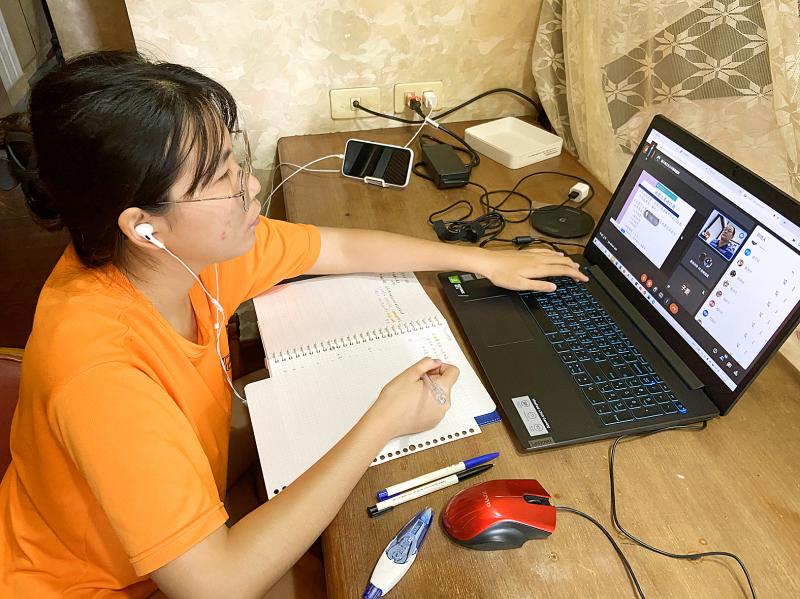Acer Inc (宏碁) and Asustek Computer Inc (華碩) last week reported strong sales for last month thanks to demand for notebook computers spurred by teleworking and distance learning amid the COVID-19 pandemic.
The companies’ operations have continued to improve since last year, as the pandemic has resulted in lifestyle changes, with remote and video communication becoming essential and prompting companies to speed up digital transformation, while PCs have become an indispensable tool in people’s daily lives.
Acer’s consolidated sales reached NT$24.81 billion (US$897.9 million), up 22.9 percent year-on-year, but down 0.6 percent month-on-month, the company said in a statement on Wednesday, adding that last month’s figure was the highest for the period in seven years.

Photo: CNA
The company attributed the annual increase to Chromebooks for distance learning, whose sales increased 30.1 percent year-on-year, and gaming products for home-bound consumers, which posted an annual sales increase of 15.3 percent.
For the first five months of this year, sales totaled NT$121.31 billion, up 36.6 percent from a year earlier, Acer said.
As orders for PCs have continued to exceed its supply, Acer said it would work closely with supply chains, as component supply remains a key factor to its shipments this year.
Asustek’s sales increased 40.36 percent year-on-year and 5.7 percent month-on-month to NT$38.58 billion last month, the highest May sales figure in the company’s history, it reported on Wednesday.
Cumulative sales in the first five months reached NT$183.19 billion, up 66.16 percent from a year earlier and also the highest for the same period, it said.
The companies’ sales were also boosted by a nationwide level 3 COVID-19 alert announced on May 19, which has led to strong pandemic-related demand, especially for notebook computers and Chromebooks, Yuanta Securities Investment Consulting Co (元大投顧) analyst Calvin Wei (魏建發) wrote in a note on Thursday.
“Asustek and Acer are the major beneficiaries of the strong work-from-home demand, given Asustek’s higher sales exposure to notebook computer business versus its peers, and Acer’s sales contribution of 10-15 percent comes from the domestic market,” Wei wrote.
Micro-Star International Co (MSI, 微星科技) also posted record-high sales of NT$15.67 billion for last month, up 43.2 percent year-on-year and 4 percent month-on-month, the company said in a regulatory filing on Wednesday.
MSI’s sales in the first five months grew 57.3 percent year-on-year to NT$78.76 billion, it said.
“With more than 60 percent sales contribution from gaming products, MSI has been the major beneficiary of the gaming uptrend,” Wei said.
However, the company has benefited mildly from the COVID-19 outbreak in Taiwan, given its sales exposure of only 2 to 3 percent to the domestic market, he said.

CHIP WAR: Tariffs on Taiwanese chips would prompt companies to move their factories, but not necessarily to the US, unleashing a ‘global cross-sector tariff war’ US President Donald Trump would “shoot himself in the foot” if he follows through on his recent pledge to impose higher tariffs on Taiwanese and other foreign semiconductors entering the US, analysts said. Trump’s plans to raise tariffs on chips manufactured in Taiwan to as high as 100 percent would backfire, macroeconomist Henry Wu (吳嘉隆) said. He would “shoot himself in the foot,” Wu said on Saturday, as such economic measures would lead Taiwanese chip suppliers to pass on additional costs to their US clients and consumers, and ultimately cause another wave of inflation. Trump has claimed that Taiwan took up to

A start-up in Mexico is trying to help get a handle on one coastal city’s plastic waste problem by converting it into gasoline, diesel and other fuels. With less than 10 percent of the world’s plastics being recycled, Petgas’ idea is that rather than letting discarded plastic become waste, it can become productive again as fuel. Petgas developed a machine in the port city of Boca del Rio that uses pyrolysis, a thermodynamic process that heats plastics in the absence of oxygen, breaking it down to produce gasoline, diesel, kerosene, paraffin and coke. Petgas chief technology officer Carlos Parraguirre Diaz said that in

Japan intends to closely monitor the impact on its currency of US President Donald Trump’s new tariffs and is worried about the international fallout from the trade imposts, Japanese Minister of Finance Katsunobu Kato said. “We need to carefully see how the exchange rate and other factors will be affected and what form US monetary policy will take in the future,” Kato said yesterday in an interview with Fuji Television. Japan is very concerned about how the tariffs might impact the global economy, he added. Kato spoke as nations and firms brace for potential repercussions after Trump unleashed the first salvo of

SUPPORT: The government said it would help firms deal with supply disruptions, after Trump signed orders imposing tariffs of 25 percent on imports from Canada and Mexico The government pledged to help companies with operations in Mexico, such as iPhone assembler Hon Hai Precision Industry Co (鴻海精密), also known as Foxconn Technology Group (富士康科技集團), shift production lines and investment if needed to deal with higher US tariffs. The Ministry of Economic Affairs yesterday announced measures to help local firms cope with the US tariff increases on Canada, Mexico, China and other potential areas. The ministry said that it would establish an investment and trade service center in the US to help Taiwanese firms assess the investment environment in different US states, plan supply chain relocation strategies and